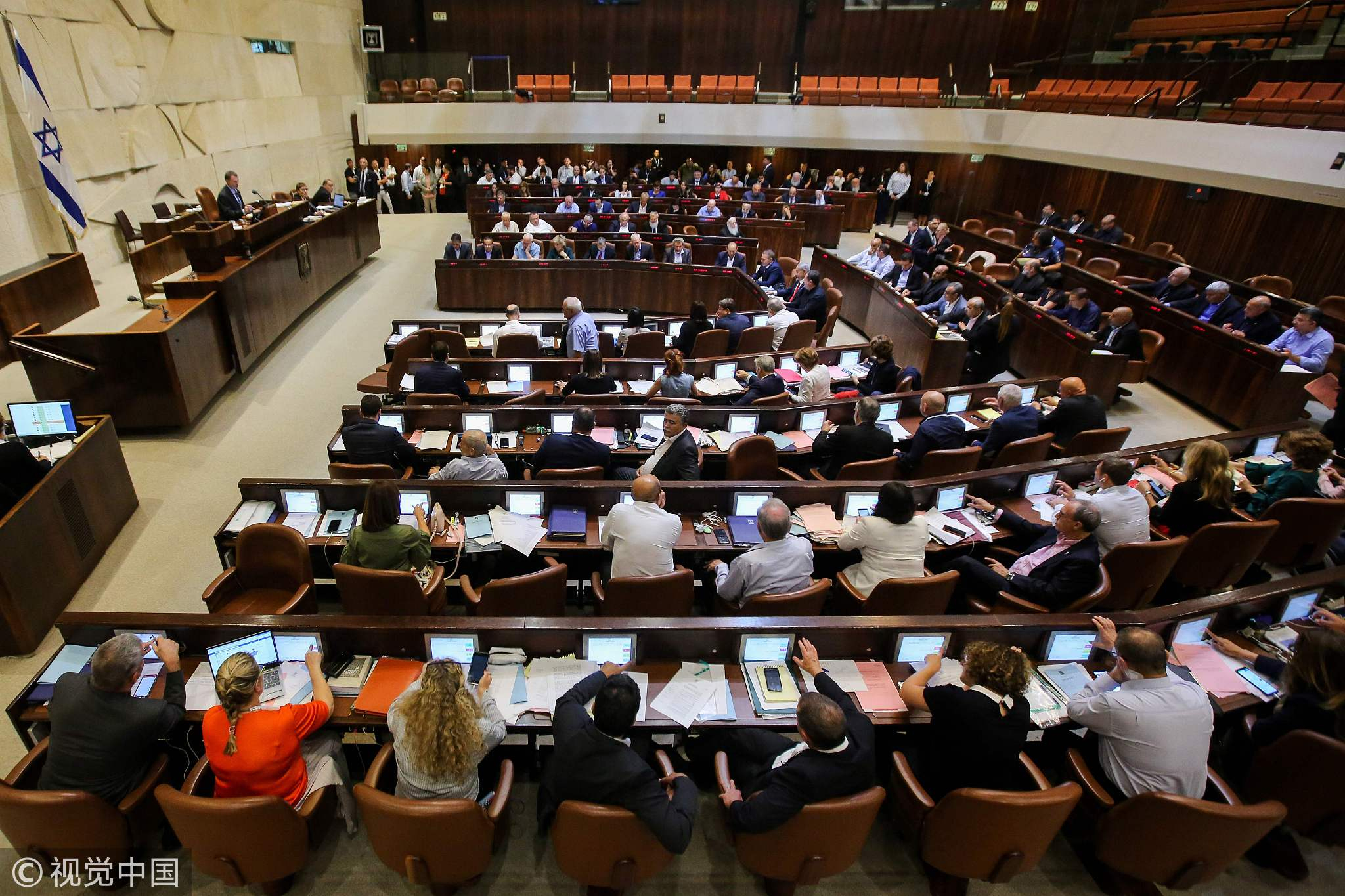
Opinions
16:16, 29-Jul-2018
Opinion: A new law that splits Israel
Updated
15:54, 01-Aug-2018
By Wang Jin

Editor's Note: Wang Jin is a research fellow at Charhar Institute and also a research fellow in Syria Research Center, Northwest University, China. The article reflects the author's opinion, and not necessarily the views of CGTN.
The controversial “nation-state law,” or the "Jewish state law” as it's called by Palestinians, was backed by Israel's right-wing bloc and passed by Israeli parliament, or the Knesset, two weeks ago.
According to the new law, Israel is defined as the Jewish state. Arabic, which had been described as one of the official languages in Israel for decades, receives “special status” under the new law.
Given that there are nearly 1.8 million Palestinians in Israel, or roughly 20 percent of the country's population, and that the Israel-Palestine peace negotiation is still at a stalemate, the new nation-state law redefines the nature of Israel and will significantly influence the process of the Israel-Palestine peace process.
According to Israeli Prime Minister Benjamin Netanyahu, the new nation-state law represents the nature of Israel: “Israel is a Jewish nation-state and respects all ethnic groups.”
According to the new law, Hebrew will become the only official language of Israel and Arabic will be given a special status. However, the details of this special status have not been explained.

Israeli members of parliament attend the Knesset Plenary Hall session ahead of the vote on the National Law which speaks of Israel as the historic homeland of the Jews and says they have a "unique" right to self-determination, July 18, 2018. /VCG Photo
Israeli members of parliament attend the Knesset Plenary Hall session ahead of the vote on the National Law which speaks of Israel as the historic homeland of the Jews and says they have a "unique" right to self-determination, July 18, 2018. /VCG Photo
The “united Jerusalem” will remain the capital of Israel, which means that any negotiation with Palestinians and other states over the final status of Jerusalem will become difficult.
Meanwhile, the nation-state law also encourages the Jewish settlements in East Jerusalem and the West Bank, and might set up new obstacles for Israeli-Palestinian peace in the future.
At home, according to many Palestinians inside Israel, the new law intends to protect the rights of the Jewish majority, and infuriate and dishonor the Palestinian citizens inside Israel.
The most troubling sentence comes from Article 7, which reads: "The state may allow the community, including members of one religion or the one nationality/ethnicity, to maintain separate communal settlement."
This article, according to many Palestinians, aims to create communication obstacles between Palestinians and Jews in Israel, since few Jews want to live in the Palestinian community, while the Jewish community may use this article to prevent Palestinians from moving in.
Ever since the modern state of Israel was established in 1948, and although the state is described as a “Jewish democratic state,” one of the major problems facing the country has been the nature of its government; Jewish or democratic – which should come first?
For many right-wing politicians and activists, the state of Israel should be exclusively for Jews, or even the “real Jewish people” who speaks fluent Hebrew and believe in the Jewish religion.
For many left-wing politicians and activists, the state of Israel should become an inclusive and tolerant state that attracts all immigrants, not only Jews, from all across the world regardless of cultural and religious beliefs.

A rally to protest against the "Jewish Nation-State Bill" in the Israeli coastal city of Tel Aviv, July 14, 2018. /VCG Photo
A rally to protest against the "Jewish Nation-State Bill" in the Israeli coastal city of Tel Aviv, July 14, 2018. /VCG Photo
Modern Israel could be traced back to the late 19th century when Jews from Europe immigrated to Palestine. The early Jewish immigrants lived side by side regardless of their differences in language, lifestyle, ideology or culture.
Even after 1948 when modern Israel was constructed, different Jewish immigrant groups moved to Israel in different periods, such as Arab Jews in the 1950s, Russia Jews in the 1990s and African Jews in the 2000s.
They moved to Israel with their own identities and religious characteristics, making it impossible to define who is a "real" Jew.
Even today, the internal splits between secular Jews and religious Jews, European Jews and Arab Jews are very salient, and a small social issue might ignite social debate or social unrest inside the small country.
The new nation-state law passed by the Knesset might inflame the hatred of Palestinians inside Israel and will be harmful to Israel’s image as a democratic state.
The new law will also boost the Boycott, Divestment and Sanctions (BDS) movement that aims at punishing Israel for its incapability of achieving peace with Palestine. The nation-state law might be a historic law that changes the nature of modern Israel while splitting it in two.

SITEMAP
Copyright © 2018 CGTN. Beijing ICP prepared NO.16065310-3
Copyright © 2018 CGTN. Beijing ICP prepared NO.16065310-3